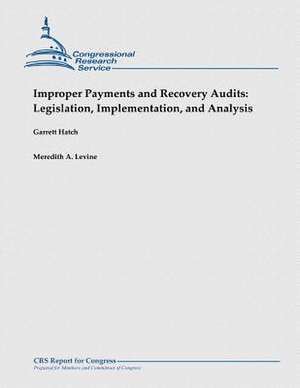Improper Payments and Recovery Audits
Autor Garrett Hatch, Meredith a. Levineen Limba Engleză Paperback
Preț: 86.86 lei
Nou
Puncte Express: 130
Preț estimativ în valută:
16.62€ • 18.11$ • 14.01£
16.62€ • 18.11$ • 14.01£
Carte disponibilă
Livrare economică 02-16 aprilie
Preluare comenzi: 021 569.72.76
Specificații
ISBN-13: 9781481914772
ISBN-10: 1481914774
Pagini: 26
Dimensiuni: 216 x 280 x 1 mm
Greutate: 0.09 kg
Editura: CREATESPACE
ISBN-10: 1481914774
Pagini: 26
Dimensiuni: 216 x 280 x 1 mm
Greutate: 0.09 kg
Editura: CREATESPACE
